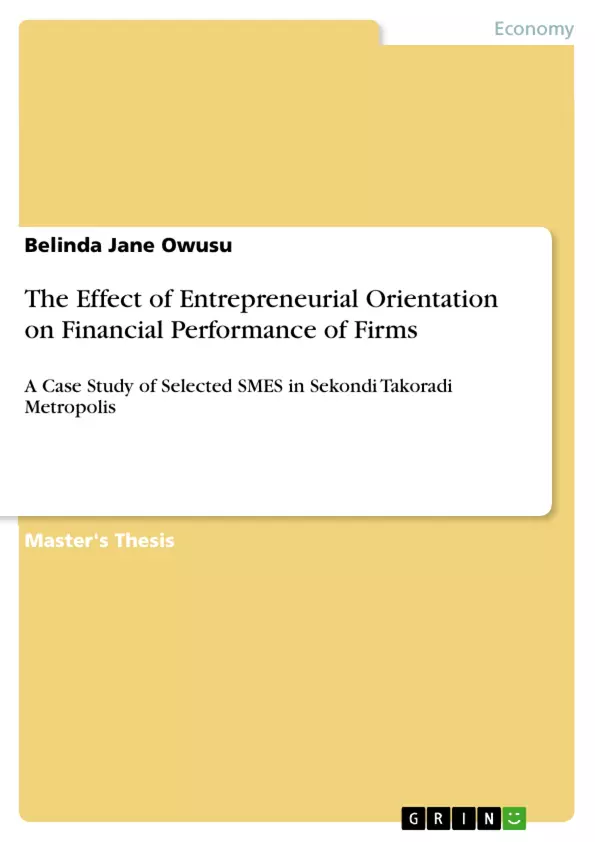The study examined the effect of entrepreneurial orientation on financial performance of SMEs using selected small and medium scale enterprises. The population of the study is made up of SMEs owner/managers of the metropolis. The study was done using an overall sample size of 120 SMEs owner/managers out of which 118 responses were received which constitute 98.3% response rate. Respondents were chosen using both purposive and convenient sampling techniques. The software utilized in data analysis was Statistical Package for Social Science version 20, and data was interpreted using regression, percentages, mean, and standard deviation. Risk-taking propensity, innovativeness, and competitive aggressiveness (independent variables) were found to have a significant effect on financial performance of SMEs (dependent variable).
This research will educate enterprise managers and entrepreneurs in numerous industries on the elements that influence entrepreneurial behavior, improve company performance, and assist the growth and development of their businesses at the firm level. The research will also give senior executive and management personnel at company’s access to the resources they need to make long-term decisions, allowing them to improve their competitive postures and capacities by improving their financial performance.
Another important value of this research is that the findings will give information to the government that can be utilized as inputs for policy creation related to entrepreneurship and entrepreneurial orientation. This research will add to the existing body of knowledge by presenting a fresh scenario and dimensions for bridging the gap in entrepreneurial success in developing countries.
Inhaltsverzeichnis (Table of Contents)
- CHAPTER ONE
- INTRODUCTION
- 1.1 Background to the Study
- 1.2 Problem Statement
- 1.3 Objectives of the Study
- 1.3.1 General objective
- 1.3.2 Specific objectives
- 1.4 Research Question
- 1.5 Justification of the Study
- 1.6 Scope of the Study
- 1.7 Summary of Methodology
- 1.8 Limitations of the Study
- 1.9 Organization of the Thesis
- CHAPTER TWO
- LITERATURE REVIEW
- 2.0 Introduction
Zielsetzung und Themenschwerpunkte (Objectives and Key Themes)
This study aims to investigate the relationship between entrepreneurial orientation and financial performance of SMEs in the Sekondi Takoradi Metropolis. The research seeks to determine the extent to which specific entrepreneurial orientation practices, namely risk-taking propensity, innovativeness, competitive aggressiveness, and proactiveness, impact the financial performance of these firms.
- Entrepreneurial Orientation and its Impact on Financial Performance
- The Role of Risk-Taking Propensity in SME Success
- The Significance of Innovation and Competitive Aggressiveness in SMEs
- The Relationship between Proactiveness and Financial Performance
Zusammenfassung der Kapitel (Chapter Summaries)
- Chapter One: Introduction
This chapter introduces the background of the study, outlining the significance of entrepreneurial orientation in SME success. It also presents the problem statement, objectives, research question, justification, scope, methodology, limitations, and organization of the thesis.
- Chapter Two: Literature Review
This chapter provides a comprehensive review of relevant literature pertaining to entrepreneurial orientation and its impact on financial performance, including theoretical frameworks, empirical studies, and existing research findings.
Schlüsselwörter (Keywords)
Entrepreneurial Orientation, Financial Performance, SMEs, Risk-Taking Propensity, Innovativeness, Competitive Aggressiveness, Proactiveness, Sekondi Takoradi Metropolis.
- Citation du texte
- Belinda Jane Owusu (Auteur), 2017, The Effect of Entrepreneurial Orientation on Financial Performance of Firms, Munich, GRIN Verlag, https://www.grin.com/document/1270173



